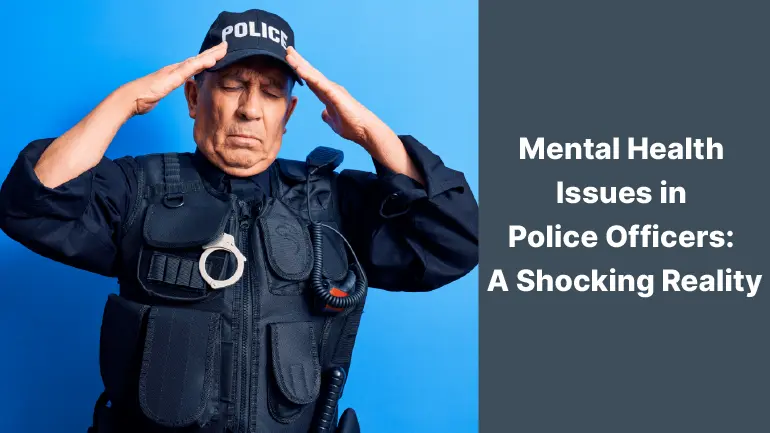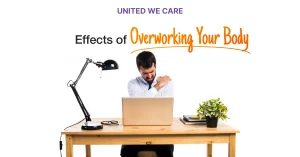Introduction
Law enforcement officers are critical in maintaining peace, order, and societal safety. Their job demands them to face numerous challenges, including high-stress situations, danger, and exposure to traumatic events. Unfortunately, this takes a heavy toll on their mental health. This article explores the reality of police mental health and suggests ways to seek help.
What is the Reality Of Police Officers’ Mental Health?
The nature of police work often exposes officers to chronic stress, and many consider it to be one of the most stressful professions in the world [1]. Researchers have found a high prevalence of mental health concerns and poor coping strategies. In one study, Syed and his colleagues found the following [2]:
- 1 in 5 police personnel were at risk of drinking
- 1 in 10 met the criteria for anxiety
- 1 in 7 police officers met the criteria for depression and PTSD
- Higher stress on the job worsened the risk for depression and suicide ideation
- High stress combined with poor coping increased the likelihood of PTSD.
- Stress is enhanced due to the negative perception of police from public
- There is also a stigma in reaching out for help, often leading to poor coping.
Researchers have also concluded that being in such a high-stress profession, police officers also have a high chance of developing heart diseases [1]. Somatic complaints such as migraine, stomach issues, and pains are also common in police personnel [3]. They also tend to adopt a cynical role and may eventually show burnout due to reduced work efficacy [3].
Why do Police Officers Face These Mental Health Concerns?
Being a police officer is full of challenges and stresses. There are many reasons this becomes a hazard to mental health, and the following are some of the most common causes.

Frequent Exposure to Traumatic Incidents
Throughout a police officer’s career, they face many violent or traumatic events to which they are first responders. Such events can include the loss of a fellow officer, incidents of stabbings, investigating gory accidents, encountering murder, assault etc [4]. Officers tend to use strategies like blocking their feelings and distancing themselves to cope with these situations leaving the emotions unprocessed. Eventually, it adversely affects their mental health and personal relationships outside of work [5].
Habit of Hypervigilance
Police personnel have an unpredictable routine, with emergencies arising at any time. This requires them to be vigilant at all times or gain the ability to shift to a high adrenaline state quickly. At times this becomes addictive and has negative physiological consequences as well. Many officers also adopt the habit of staying over alert outside of work and looking at the world through the lens of danger [5].
A Culture of Being “Macho”.
Police officers live in a “Macho” culture. This culture discourages individuals from openly discussing their concerns and fears. People tend to consider talking about emotions as weak and for police officers, this undermines their reliability and trustworthiness in the eyes of colleagues. So, macho culture becomes a barrier to seeking mental health support [6].
Poor Coping Strategies
As police officers, individuals try to use coping strategies like avoidance or dissociation to maintain focus during events which are extremely stressful [6]. But, this also lowers their capacity for empathy and connection to others in their surroundings. This increases the chances of loneliness in relationships. They also tend to utilize strategies like drinking or using drugs outside of work to cope with their emotions, eventually leading to disorders like depression or substance abuse.
Stigma Surrounding Mental Health in Police Officers
A significant stigma is associated with mental health and seeking help in police culture. Officers believe that if they share their mental health problems with anyone, authorities will give them desk duty or confiscate their service weapons. Authorities might also force them to take administrative leave and they might end up becoming the subject of gossip or discussions among coworkers. This fear of being ostracized by their colleagues and appearing inadequate in their work reduces the chances of officers accepting and reporting mental health issues [5].
Researchers working in the mental health field have cited stigma as one of the main reasons for perpetuating mental health concerns [7]. It is essential to address this stigma at both personal and policy levels to improve the current working conditions of police personnel.
How can a Police Officer ensure balanced Mental Health?
While there is an increasing call to support police personnel by researchers, much has not changed in terms of ground reality. Thus, Police Officers must work to balance their mental health and avoid negative consequences. If you are a police officer, here are some strategies you can use:

1) Develop Social Support
Social support means talking to others. This “other” can be anyone including trusted seniors or colleagues. You can also join an officer support group where other police personnel meet and talk about their challenges. You must know, a higher level of social support significantly lowers the chance of issues like PTSD especially in police officers [2].
2) Develop Hardiness and Meaning in the Course of Work
Did you know? Studies have shown that officers who attach a sense of purpose to their work tend to frame negative situations as those with opportunity. Further, those who have high commitment are less likely to face adverse effects of their job [3]. These are aspects of a trait called “hardiness”. It can be helpful to develop the hardiness trait when working as a police officer who faces such negative situations on a daily basis.
3) Improve Coping Strategies
While you may find it necessary to employ distancing strategies when conducting an investigation, it is essential to have different coping strategies off the field. You can indulge in positive coping like relaxation, mindfulness, or playing with friends to balance your mental health.
4) Spend Time on Physical Health
Physical and mental health are closely related. If you add in your schedule even 30-40 minutes of exercise or any other activity that improves physical health, the benefits are going to be many. Exercise can lower the risk of cardiovascular diseases and even provide an outlet for letting negative emotions out.
5) Accessing Professional Help
It is important to overcome your fear of stigma and seek help. This is especially true when symptoms of PTSD or depression start surfacing. Therapists can help in dealing with trauma and can help you bounce back from the negative situation as well as improve your life and relationships quicker.
Conclusion
No one can ignore the shocking reality of mental health among police officers. The demands of your job are such that you are constantly exposed to traumatic events. This can take a severe toll on your well-being. We as a society need to acknowledge these challenges and promote mental health support for police officers. However, till that happens, if you are a police officer, know that your mental health and well-being is valuable. You can take steps to ensure that you are not walking towards breakdown or burnout and are saving yourself along with protecting our community.
If you are a police officer or knows one who is in need of mental health support, contact the experts at United We Care. At United We Care, our wellness and mental health experts can guide with the best methods for well-being.
References
- J. M. Violanti et al., “Posttraumatic stress symptoms and subclinical cardiovascular disease in police officers.,” International Journal of Stress Management, vol. 13, no. 4, pp. 541–554, 2006. doi:10.1037/1072-5245.13.4.541
- S. Syed et al., “Global prevalence and risk factors for mental health problems in Police Personnel: A systematic review and meta-analysis,” Occupational and Environmental Medicine, vol. 77, no. 11, pp. 737–747, 2020. doi:10.1136/oemed-2020-106498
- T. Fyhn, K. K. Fjell, and B. H. Johnsen, “Resilience factors among police investigators: Hardiness-commitment a unique contributor,” Journal of Police and Criminal Psychology, vol. 31, no. 4, pp. 261–269, 2015. doi:10.1007/s11896-015-9181-6
- T. A. Warren, “The effects of frequent exposure to violence and trauma on police officers,” WALDEN DISSERTATIONS AND DOCTORAL STUDIES, https://scholarworks.waldenu.edu/cgi/viewcontent.cgi?article=2328&context=dissertations (accessed May 24, 2023).
- B. J. Koch, “The psychological impact on police officers of being first responders to completed suicides,” Journal of Police and Criminal Psychology, vol. 25, no. 2, pp. 90–98, 2010. doi:10.1007/s11896-010-9070-y
- Emergency personnel’s experiences of their role – Lancaster University, https://eprints.lancs.ac.uk/id/eprint/127462/1/2018RutterLDClinPsy.pdf (accessed May 24, 2023).
C. J. Newell, R. Ricciardelli, S. M. Czarnuch, and K. Martin, “Police staff and Mental Health: Barriers and recommendations for improving help-seeking,” Police Practice and Research, vol. 23, no. 1, pp. 111–124, 2021. doi:10.1080/15614263.2021.1979398
Unlock Exclusive Benefits with Subscription
-
Premium Resources

-
Thriving Community

-
Unlimited Access

-
Personalised Support












